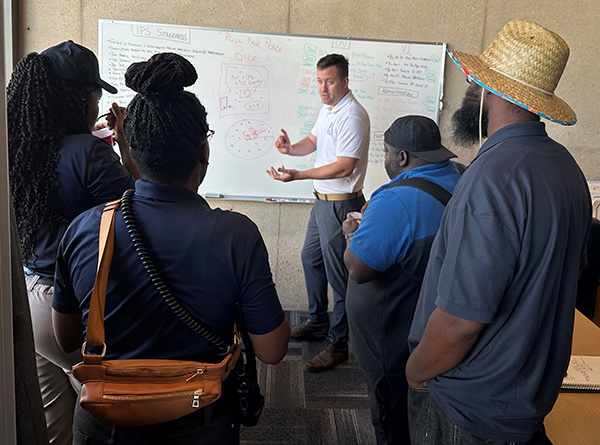COLLEGE STATION In the United States, October is National Crime Prevention Month. But all year long, Texas A&M Engineering Extension Service (TEEX) trains cities to prevent crimes before they happen through their Crime Prevention Through Environmental Design (CPTED) course. CPTED involves changing the design of a space to reduce the opportunity for crime and enhance the quality of life.
In February of this year, Kevin Oden, director of integrated public safety solutions for the city of Dallas, arranged for his crime prevention unit to take the course and become certified CPTED practitioners. In addition to crime unit members, detectives, city attorneys and planners attended the training.
Oden’s team of CPTED practitioners identifies areas with violent crime and quality of life concerns. They perform CPTED assessments on these properties and provide owners with a report describing realistic changes they could implement to make the property safer. Oden says, “You can tell someone they need a one million dollar camera system, but that often isn’t feasible for a small business owner. There are a lot of things that don’t cost as much. For example, hedge clippers can create a safe zone by landscaping and clearing a line of sight.” Additionally, the city of Dallas has implemented changes, such as investing in public lighting upgrades, landscape design and securing vacant structures.
Between taking the course in February and the close of September, Oden’s team performed CPTED assessments and made improvements on 117 properties within Dallas. In this short time, they have already seen results. On properties receiving CPTED assessments, police calls for assistance were down 24%, and violent crime was down 26.8%. Overall, in Dallas, violent crime is down 9% compared to last year, and Oden says much of that is due to a reduction in incidents at the CPTED-assessed properties. In addition to preventing incidents, the changes have helped reduce the need for police response at these properties.
Oden recommends CPTED for all municipalities, saying, “It’s critical everywhere in the country, no matter a city’s size. There are crisis levels of shortages of law enforcement professionals, but there is also a higher demand for calls for service or violent crimes. If we can prevent incidents from occurring, there are fewer victims, and that’s the most critical aspect, but it also removes a burden from overworked and understaffed patrol.” In addition to these benefits, CPTED improves the quality of life for people in the area and creates new opportunities for economic development.
Oden says of his experience training with TEEX, “When you take a weeklong training, that’s a big commitment. It certainly helps tremendously when you have good instruction. Our instructor was incredible; he was engaged, and he was conversational. That makes a big impact on making that investment worth it.” Oden found the course so valuable he plans to bring TEEX back to get more staff members CPTED certified.
TEEX instructors travel around the country to teach CPTED and make communities safer. To learn more or to schedule a course, visit https://teex.org/class/sap302/. To read TEEX’s exclusive interview with architect-criminologist and professor Dr. Randy Atlas, visit https://teex.org/news/changing-the-crime-timeline-through-environmental-design/
For more information about TEEX, visit TEEX.org




